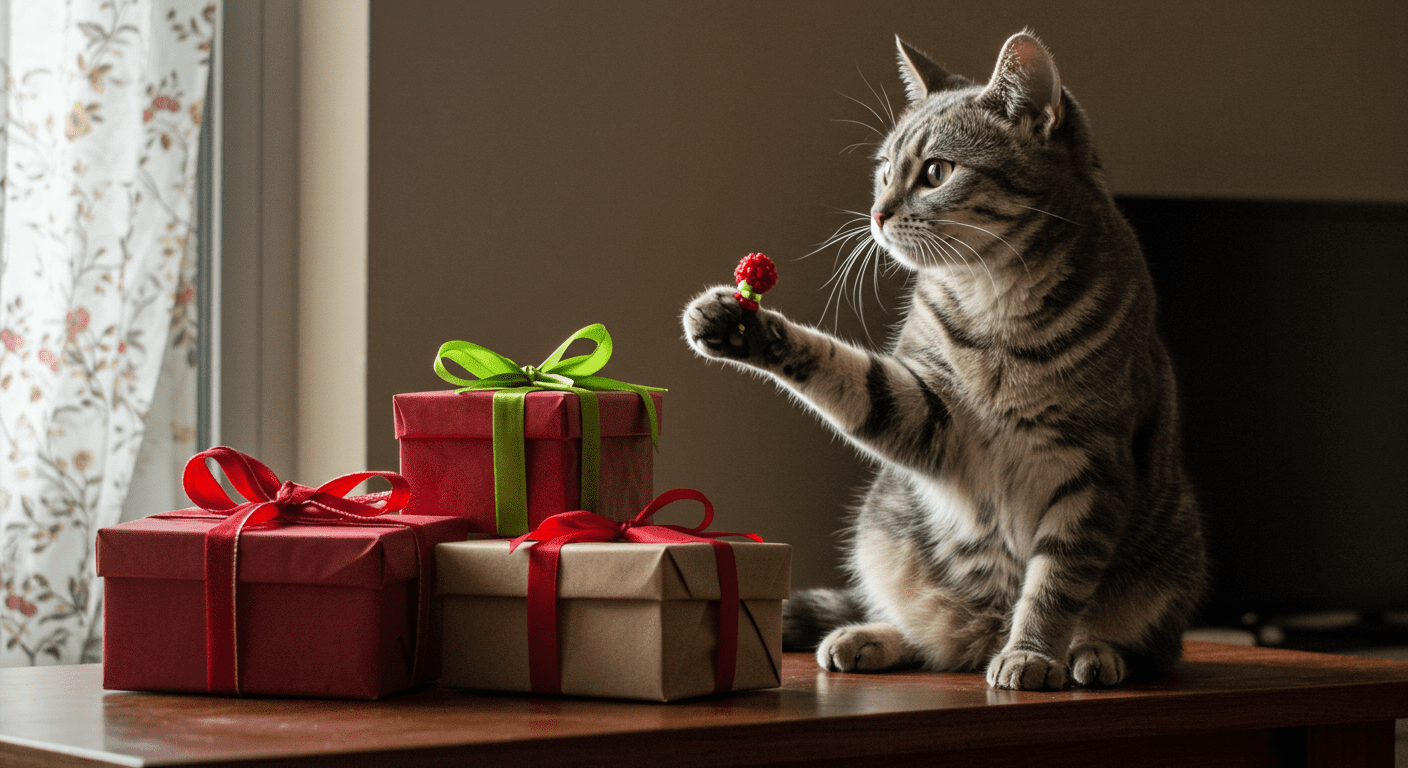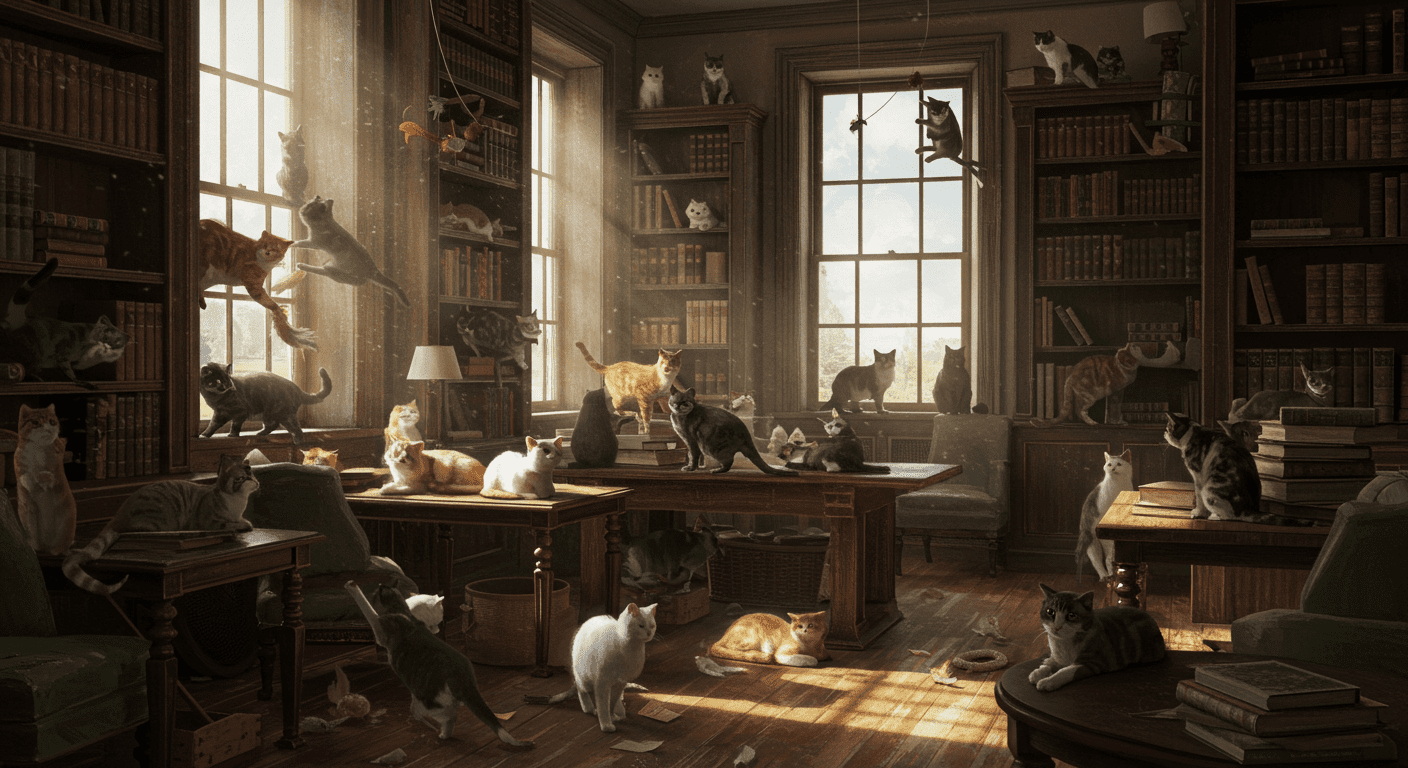Cats are interesting animals, aren't they? They go around with an air of mystery that makes us humans scratch our heads in perplexity. As a cat owner, I often think about some fairly interesting things about my furry pet. Why does she keep knocking stuff off the table? What is that strange sound like a cat purring? And why does she think my lap is her throne? You're not alone if you've asked yourself similar questions about cats. Let's look at some common questions and see if we can clear up the cat fog together.
Top Takeaways and Key Concepts
- Notice your cat’s purring—it can signal comfort, stress relief, or healing.
- Redirect knocking behavior by offering toys and play zones that satisfy curiosity.
- Praise your cat’s “gifts” calmly—they’re showing affection and teaching instincts.
- Feed senior cats nutrient-rich, hydrating meals designed for older digestion.
- Keep cats active with interactive toys, climbing spaces, and daily play sessions.
Summary:
This text explores the fascinating world of feline behavior, explaining why cats purr, knock things over, bring “gifts,” become picky eaters in old age, and need regular playtime. Purring isn’t just a sign of happiness—it can also calm and heal both cats and humans. Knocking objects down stems from hunting instincts and curiosity, while “gifting” prey or toys is a gesture of love and teaching. Senior cats need balanced, hydrating diets and consistent water to stay healthy. Finally, keeping cats engaged with toys, climbing structures, and rest time promotes their physical and emotional well-being, helping owners better understand and care for their mysterious companions.
Jump to Content
Why Do Cats Purr?

Please Note: This post may contain affiliate links. If you click one of them, we may receive a commission at no extra cost to you. As an Amazon Associate, I earn from qualifying purchases.
Cats purr not only when they're happy but also when they're scared, in pain, or even when they’re healing. It's like their own built-in therapy sound—think of it as a furry version of a stress ball!
“Cats are connoisseurs of comfort.” — James Herriot
Doesn't the sound of a cat purring just make you feel good? But have you ever thought about why cats do it? Purring is an interesting sound that doesn't always mean contentment. A lot of people think of it as a sign of happiness, like when your cat curls up next to you on the couch, but it can also mean that something is wrong or even painful. It's like their own language!
When cats purr, they release endorphins, which make them feel better when they're stressed. So, if your pet is worried about a thunderstorm or going to the vet, she might start purring to calm herself down. Isn't that interesting? We generally think of purring as a sign of happiness, but it can also help our cats calm down when things get stressful.
Fun Cat Facts About Purring
– Purrfect Frequency: Cats purr at a frequency between 25 and 150 Hertz, which is the same range that promotes healing in bones and tissues—so they might just be little furry doctors!
– Purring for Peace: Some cats purr when they're happy, but they also do it when they're scared or in pain. It's like their way of saying, “I’m fine! Just don’t look at me!”
– The Mystery of the Motor: While we think of purring as a sign of contentment, some scientists believe cats may also purr to communicate with their humans—like a built-in “feed me” signal disguised as cuteness!
Some studies also show that the sound of a cat's purr can help recover! What an interesting idea! Did you know that your lap warmer could also be a healer? Studies have found that the vibrations that a cat makes when it purrs usually fall between 25 and 150 Hertz. It is thought that this frequency can help with a number of health problems, such as inflammation and pain reduction. It's like having a fuzzy little therapist at home that not only listens but also helps fix broken hearts or bones!
Picture this: you're relaxing on the couch when your cat comes up to you and starts to purr. You're not only enjoying the warm comfort of her presence, but she's also doing magic behind the scenes! The vibrations from her purring can help your body heal and hers as well. Some specialists even say that these calming noises can help bones get stronger and tissues heal faster. What a lot of work to do!
But don't forget that cats know when we need comfort without even thinking about it. Have you ever noticed that your cat seems to be drawn to you when things are hard? They can tell how we feel, whether it's after a long day or when we're sick. So when they settle down next to us and start to rumble softly, it feels like they're saying, “Hey, I'm here for you.” With all this support, it's hard not to feel great!
Handy Amazon Shopping Directory for Cat Supplies
Cat Food - Cat Toys - Cat Health - Grooming - Carriers - Cat Beds - Apparel
Furniture - Cat Doors - Collars - Feeding/Watering - Flea/Tick Control - Treats
This is interesting since it's not just people that profit from this; cats do too! They probably heal faster when they purr while recovering from an injury or illness. Basically, those repetitive sounds help them calm down and heal, which makes them really amazing animals.
So, the next time your cat rolls up in your lap and starts to purr, take a moment to think about how much better you both might feel. You have a furry friend who can help you relax and heal all at the same time! Isn't it amazing how something so simple can have such big effects?
Why Do Cats Knock Things Over?

Cats knock things over to assert their dominance and test the laws of physics. It’s like they’re saying, “If I can’t have it, no one can!” or perhaps just auditioning for a role in a chaotic comedy.
“Cats are smarter than dogs. You can't get eight cats to pull a sled through snow.” — Jeff Valdez
Let's speak about one of the great mysteries of life: why do cats feel the need to knock things off tables and shelves? If I had a dollar every time I saw my cat knock something off the counter for amusement, I could pay for all of her treats!
It's interesting that this behavior comes from their instincts as hunters. In the wild, cats would hit things to see if they were food. By hitting things, they are checking to see if they are alive, which is like asking, “Is this thing edible?” So when Fluffy knocks your favorite cup to the floor with joy, she's only letting out her inner lioness.
Fun Cat Facts About Knocking Things Over
– Gravity Gurus: Cats have a natural talent for knocking things over because they’re testing gravity—it's their version of a scientific experiment to see what falls and what stays!
– Attention Seekers: When your cat knocks something off the table, it’s not just chaos; it’s their way of saying, “Hey, human! Look at me! I’m much more interesting than that boring vase!”
– The Art of Destruction: Cats often knock things over to create their own mini “art installations.” They believe every object on a shelf is just waiting for its moment to be transformed into a masterpiece of mess!
On the other hand, it seems like they do it just for fun occasionally! Have you ever seen your cat knock over a glass or bat at your beloved vase and thought, “What are you doing?” It can be very annoying to see your cat knock over your favorite things with only a flick of her paw. But here's the thing: cats love attention, even if it's bad. What better way to get you to run around than to make a small disaster?
Imagine this: you're happily sipping your coffee when you hear the distinct sound of something hitting the floor. You jump up, half-expecting to see a thief, but instead you see your furry buddy looking as innocent as ever. To be fair, she might even say, “What?” The look on her face that says “I didn't do anything!” makes it impossible not to giggle. She thinks she's merely playing a game of physics and cause and effect.
It's interesting that cats are natural hunters and explorers. Their instincts make them interact with their surroundings in ways that we might not always get. When they hit things on tables or counters, they're using their playful side to practice the hunting abilities they've learned over thousands of years. It could look like she's trying to get you (and your favorite things), but she's really just doing things that come naturally to her.
The next time you have to clean up broken glass and try not to curse under your breath and, let's be honest, we've all been there… remember that she's not being bad; she's just following her instincts! Instead of getting angry, you might want to think about channeling that energy somewhere else. Make some special play places for her with toys that will make her curious without putting your things at risk. Feather wands or laser pointers can keep her busy and stop her from turning your living room into an obstacle course.
When you get a cat, you have to accept that they will do strange things as part of the agreement. They make us happy and giggle, even if they do break a dish or two now and then. So, the next time she throws something off the shelf, take a big breath and remember that it's just another day with our naughty little friends!
Why Does My Cat Bring Me “Gifts”?
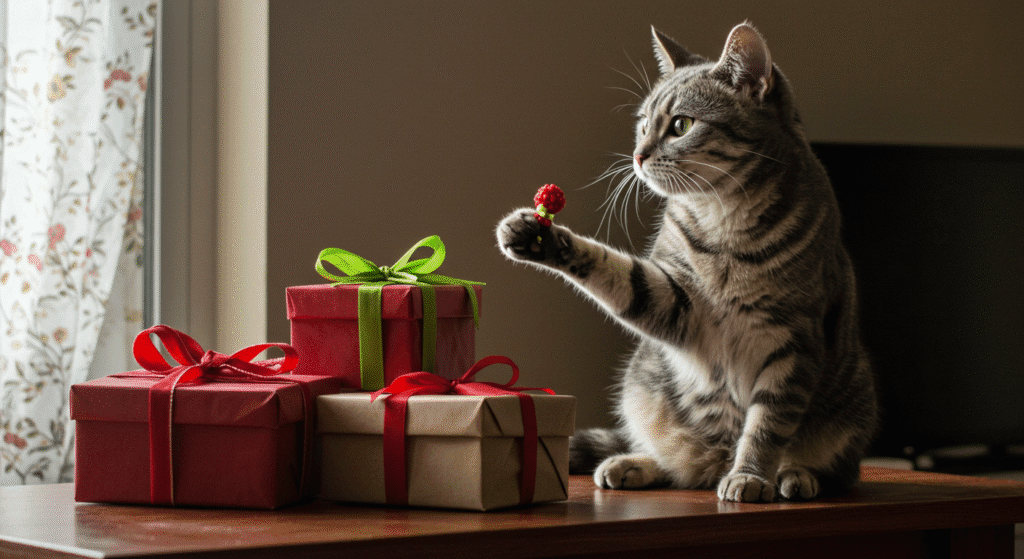
Cats bring you “gifts” like dead mice or random objects as a way of showing their affection and hunting prowess. They think they’re teaching you how to hunt, which is both sweet and slightly terrifying—like your cat is the world's fluffiest life coach.
“Time spent with cats is never wasted.” — Sigmund Freud
If you've ever received an unexpected “gift” from your cat, a mouse toy or perhaps an unfortunate bug, you already know exactly what I mean! At first glance, these offerings might seem gross or puzzling. Why would my sweet kitty want me to deal with her latest catch?
To be fair, this behavior has roots in their hunting instincts too! When cats bring their owners these so-called gifts, they are actually showing affection and pride in their hunting skills. Think of it as them saying “Look what I caught for you!” It’s their way of sharing their success and providing for you.
Fun Cat Facts About “Gifts” from Your Feline Friend
– Nature's Hunter: When your cat brings you a “gift,” they’re not just being generous; they’re showing off their hunting skills, as if to say, “Look what I caught! You can thank me later!”
– Gift of Love: Cats often bring you gifts because they see you as part of their family. It’s like them saying, “Here’s a snack for you—because sharing is caring!” (Even if it’s a half-eaten mouse!)
– Training You Well: By bringing home “presents,” your cat might be trying to train you to hunt better. It’s their way of saying, “You need more practice; let me show you how it's done!”
Some experts think that this behavior is similar to how mother cats teach their offspring how to hunt by bringing back prey. Can you believe that? When your cat leaves a dead mouse at your feet, she might think she's doing you a favor. It's almost like she's saying, “Look what I caught!” It's time for you to learn how to take care of yourself in case you run out of food!
Imagine this: your cat walks into the room with her tail up high, showing off her latest “catch.” You're probably standing there with your mouth open and your heart racing, wondering if your cat has mistaken you for another hunter or just gone crazy. But from her point of view, she's giving you a gift: the chance to learn how to survive! It's kind of cute if you can get past the fact that it features a real dead animal.
This instinctive response goes back a long way in their evolutionary history. Mother cats often bring back tiny animals to show their kittens how to hunt. It's all part of the learning process. They show you how to handle and consume what they catch, and they also feed you. So, when your cat gives you her “prize,” she might well be attempting to teach you some important life lessons. That's nice, isn't it? Kind of!
This doesn't imply we want our living rooms to be full of little bugs or things that have been eaten. I mean, who hasn't freaked out when they found a dead mouse on the welcome mat? To be fair, it can seem more like a scary movie than a nice thing to do. But knowing why they act this way lets us see our cats' instincts as more than just dirty little predators.
So the next time your cat shows off her latest kill, take a moment to think about why she did it, even if it seems silly to us humans. You may offer her some extra pets and praise (while secretly getting rid of the “gift”) because deep down, she's only trying to share her knowledge and care for you in her own weird manner! After all, who wouldn't want their furry friend to look out for them, even if it means having to deal with fur and small claws?
What Should I Feed My Senior Cat?
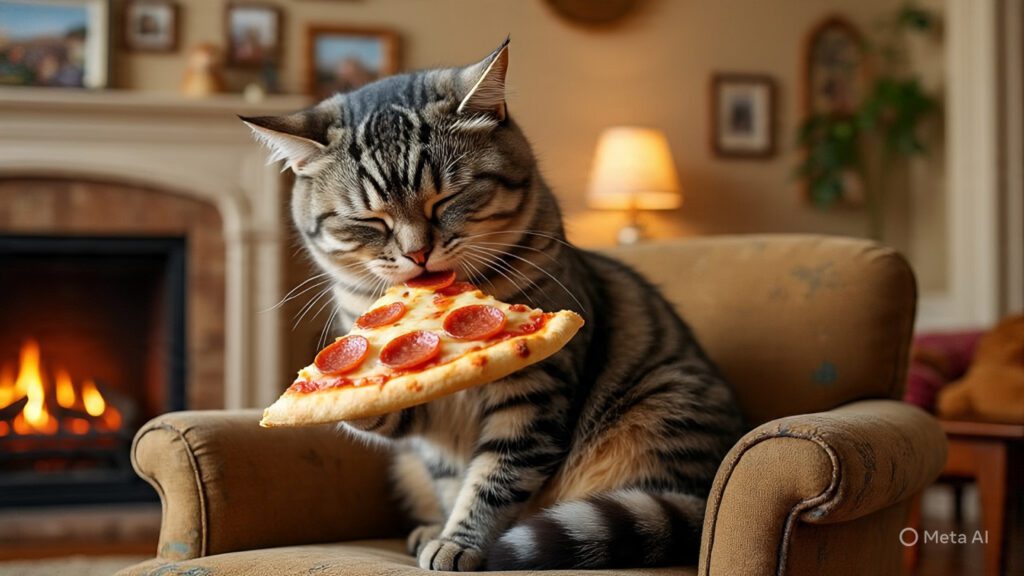
Senior cats can be picky eaters, often treating their food like a five-star restaurant menu. Some will turn their noses up at kibble if it’s not served at precisely the right temperature—because apparently, they expect gourmet meals from you, complete with a side of “I’m too old for this dry stuff.”
“I have studied many philosophers and many cats. The wisdom of cats is infinitely superior.” — Hippolyte Taine
As our beloved felines age gracefully into their golden years (and let’s face it—they're still adorable no matter what), feeding them properly becomes increasingly important. But what should you really be putting in that bowl besides treats shaped like fish?
Honestly speaking, senior cats have different dietary needs compared to younger ones. Their metabolism slows down—and let’s not forget about those potential health issues creeping up on them—so it's crucial to choose high-quality food that's easy on their digestion yet still packed with nutrients. Try looking for some options that have been specifically formulated for senior cats. These types will usually contain fewer calories while ensuring all essential vitamins are included.
Fun Facts About Feeding Your Senior Cat
– Gourmet Taste Buds: Senior cats often become picky eaters, so don’t be surprised if they suddenly prefer gourmet meals over their usual kibble—think of it as their feline version of fine dining!
– Culinary Chefs: Some senior cats may act like little food critics, sniffing at their meals and turning up their noses. You might need to channel your inner chef and whip up some enticing dishes just to get them interested!
– Snack Attack: Older cats can have a penchant for snacks, sometimes preferring small, frequent meals. It’s like they’ve embraced the philosophy of “why have one meal when you can graze all day?”
Always have fresh water on hand is another advice. It's like the most important rule for taking care of cats. Keeping elderly cats hydrated is very important for their health and happiness, especially since their kidneys may not work as well over time. You wouldn't want to be thirsty, would you? Neither does your furry pal!
Picture this: you're sitting on the couch with a bowl of popcorn and suddenly you remember that you haven't taken a drink of water in hours. You feel like your mouth is full of sand, and all you can think about is how thirsty you are. Now think about how your cat feels when her water bowl is empty or old. Not so good, huh? That's why it's so important to keep her hydrated!
Older cats are more likely to get dehydrated since their natural thirst may not be as powerful as it used to be. It's like they forget that drinking is a thing, as when I forgot my own birthday! So make sure she always has access to clean, fresh water. A huge dish full of food can do a lot for her health in general.
Now comes the fun part: putting wet food in the mix! This isn't just a reason to give your cat tasty treats (though let's be honest, who doesn't love giving their pets treats?). Wet food has more moisture than dry kibble, thus it can really help her drink more fluids without her even knowing it. It's like putting vegetables in a smoothie without her knowing.
A lot of cats like wet food better than dry kibble. Even the pickiest diners will want to eat and drink while relishing every delicious bite just from the smell. What a great situation for all sides! You can feel good about helping her keep hydrated while she eats a delectable treat that makes mealtime feel even more special.
When taking care of your older cat, don't forget to keep them hydrated. It's important for their health and happiness as they get older and spend time with you. Fill those dishes with fresh water and think about adding some wet food every now and then. It may be the best part of her day! After all, who wouldn't want their beloved cat to feel great and be well-hydrated?
How Can I Keep My Cat Active?
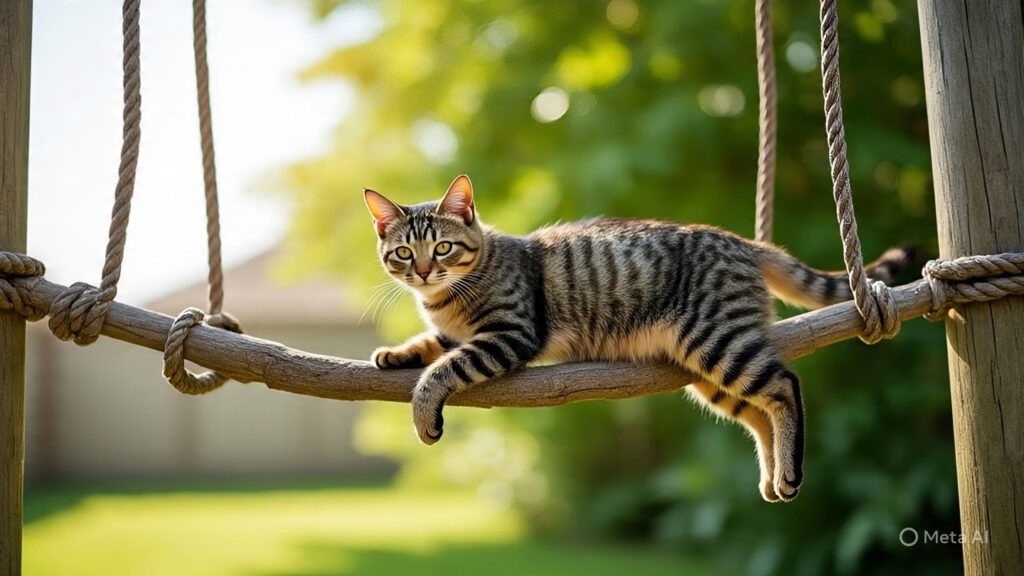
Cats have a built-in gym routine that involves sprinting at 3 AM, but if you want to keep them active during the day, try engaging them with laser pointers or feather toys. Just remember, no matter how much exercise they get, they’ll still insist on napping for 18 hours—because being a cat is exhausting work!
“What greater gift than the love of a cat?” — Charles Dickens
We all know cats love lounging around more than anything else, especially when there’s sun streaming through the window—but keeping them active is vital for maintaining good health as they age! So how do we encourage our fluffy friends to shake off those sleepy vibes?
When it comes to cats, playtime is key! Engage them with interactive toys like feather wands or laser pointers (just watch out where those beams land!). Regular play sessions stimulate both physical activity and mental engagement; plus watching them chase after something will give anyone giggles galore!
Fun Ways to Keep Your Cat Active
– Laser Light Olympics: Cats can turn a simple laser pointer into their own Olympic sport, showcasing impressive leaps and bounds as they chase that elusive red dot. Just be prepared for the inevitable “I caught it!” moment when they finally stop!
– Boxing Champions: Forget fancy toys—your cat may prefer a good cardboard box! They’ll transform it into a fort, a spaceship, or even a wrestling ring, proving that creativity knows no bounds when it comes to staying active.
– Hide-and-Seek Masters: Cats love to engage in games of hide-and-seek with you. If you hide behind the couch and pop out unexpectedly, expect your cat to leap into action like an acrobat, proving that playtime is always an adventure!
You might also put up climbing structures or scratching posts in your home. Believe me, it's like making a mini amusement park for your cat! It's in their DNA that cats are natural climbers and scratchers. When they have their own places to climb and scratch, they may do so without using your beautiful furniture as a scratching post. Honestly, seeing your cat tear up that pricey couch isn't the best part of your day.
Picture this: you stroll into the living room and see that your favorite recliner looks like it recently survived a tornado. There are scratches all over! It will make you cry. But if you provide them the right places to let off steam, like big cat trees or strong scratching posts, you'll save yourself some trouble (and maybe even some money). Cats love to climb high and look down on their kingdom, so offering them vertical space may keep them busy for hours.
And there are so many great things to do! You may have multi-level cat trees with cozy places to sleep, ramps that make it easy for your cat to get to them, or even shelves that hang on the wall and turn your walls into a cat playground. Just imagine Fluffy climbing her own Mount Everest as you sit on the couch and drink coffee, feeling like the best pet parent ever!
On the other hand, don't forget about taking good breaks as well. When you're busy putting together climbing structures and play spaces, it might appear like balance is important, but it is! Our animal friends need time to relax after a busy day, just as we do. When you get too excited, you can become overstimulated. For example, cats can have a mini-meltdown after playing too hard.
Make sure there are lots of warm places where your cat can curl up and get some rest. These little havens, like a sunny windowsill or a soft bed in a quiet corner, provide her the time she needs to relax and keep her health in check. After a day full of adventures, who doesn't love cuddling up for a good nap?
So, keep in mind that giving your cat climbing structures and scratching posts is important for her health and happiness. However, making sure she gets enough exercise, and rest will help her body and mind stay healthy. You may make her happy by giving her a place where she can follow her natural impulses and have some quiet time to herself. This will make you happy too! In the world of pet rearing, it's a win-win situation.
In conclusion…
Cats are very complicated creatures with strange habits and behaviors that will keep any owner interested—and occasionally confused! By answering these common cat questions together today, we've learned more about our furry friends than ever before.
So, the next time you wonder why your cat brings home “gifts” or knocks over every cup she can reach, remember that there's always more going on beneath the surface that will wait for us to ask… or maybe until they think we're ready!
Suggested Resources
The Spruce Pets – Understanding Your Cat's Behavior
https://www.thesprucepets.com/understanding-your-cats-behavior-554169
PetMD – Common Cat Health Questions Answered
https://www.petmd.com/cat/centers/common-cat-health-questions-answered
American Association of Feline Practitioners – Senior Cat Care
https://catvets.com/guidelines/practice-guidelines/senior-cat-care

Kevin Collier is a dedicated feline enthusiast and expert contributor at CatFAQ.com, where he shares his knowledge on cat health, training, and overall well-being. With years of experience caring for and studying cats, Kevin provides insightful tips and practical advice to help cat owners nurture and understand their pets better. His passion for enhancing the human-animal bond shines through in his articles, making them a valuable resource for anyone looking to improve their cat’s quality of life. Whether it’s training techniques or health care tips, Kevin aims to empower cat owners with the information they need to ensure their furry companions thrive.

